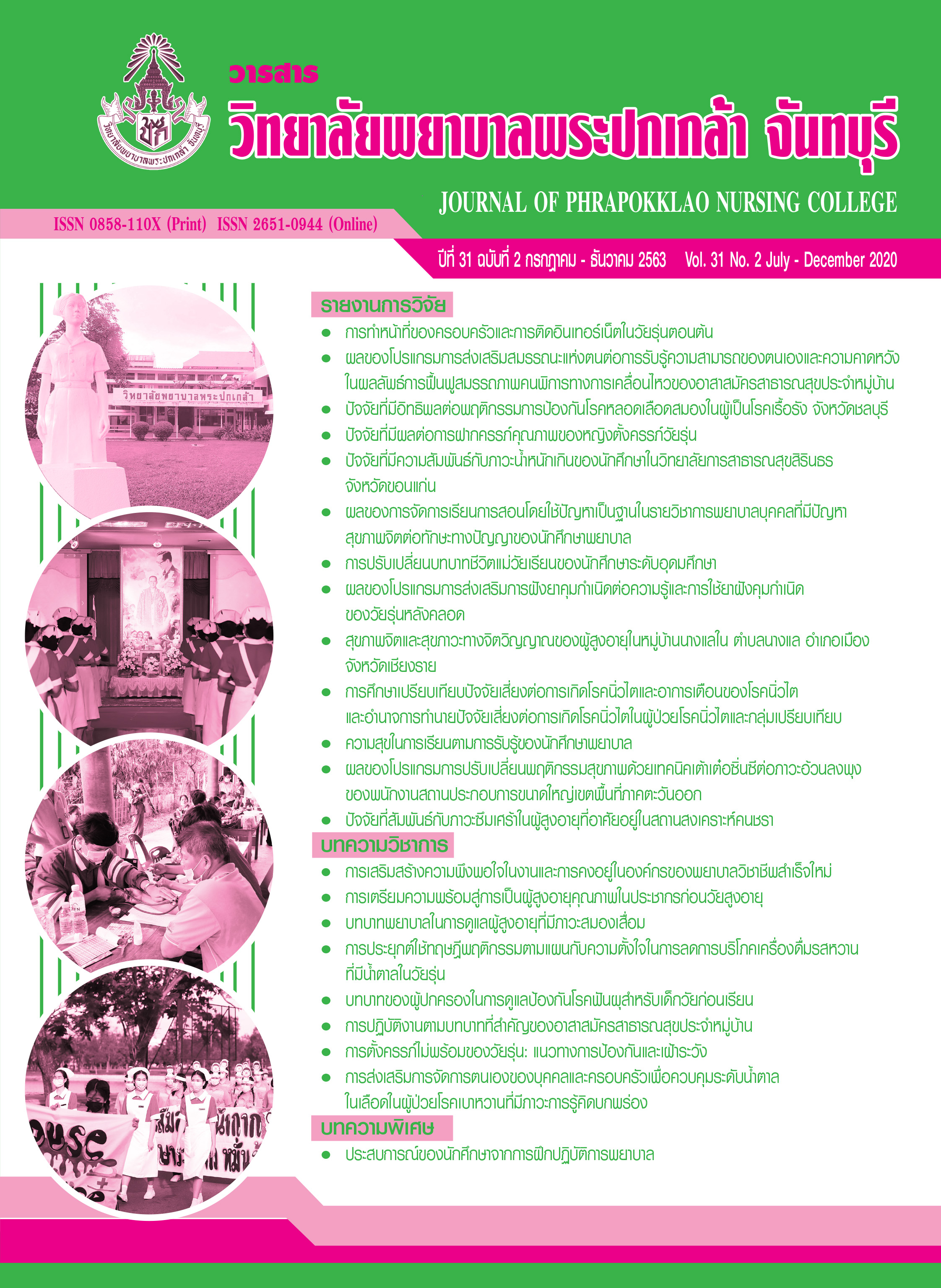Strengthening Job Satisfaction and Retention in the Organization of New Graduate Registered Nurses
Keywords:
Job satisfaction, Retention in the organization, New graduate registered nurseAbstract
Nursing is a job that covers most jobs of health organizations. It directly related to people’s lives, and health is a combination of health promotion, prevention, cure, and recovery. Currently, Thailand lacks registered nurses in all parts of the healthcare services, including public and private hospitals. The lack of registered nurses results from the shorting time of their works, especially the new graduate registered nurses who are in the generation Y. The guidelines of strengthening job satisfaction and retention in the organization of new graduate registered nurses related to the strengthening professional status policy, developing and promoting academic progress, adjusting job description for flexibility, creating incentives for fair and suitable salaries, awards, bonuses, compliments, compensation, and welfare, promoting a good quality of life, increasing relationships between colleagues, and enhancing participating or sharing in nursing activities.
References
กรมสุขภาพจิต. (2562). Gen Y/Gen Me กลุ่มผู้กุมชะตาโลก. สืบค้นจาก https://www.dmh.go.th/news/view.asp?id=1251
กูลจิตร รุญเจริญ. (2562). ปัจจัยที่มีความสัมพันธ์กับความเครียดและการจัดการความเครียดของพยาบาล โรงพยาบาลศรีสะเกษ. วารสารการแพทย์และสาธารณสุข มหาวิทยาลัยอุบลราชธานี, 2(1), 1–10.
ณรงค์ สหเมธาพัฒน์. (2554). สธ. เร่งเครื่องบรรจุหมื่นอัตราแก้พยาบาลขาด. สืบค้นจาก https://suchons.wordpress.com/2011/06/15/%E0%B8%AA%E0%B8%98
ดลฤดี รัตนปิติกรณ์. (2552). ปัจจัยทำนายการคงอยู่ในงานของพยาบาลวิชาชีพเครือโรงพยาบาลพญาไท (วิทยานิพนธ์ปริญญามหาบัณฑิต). นนทบุรี: มหาวิทยาลัยสุโขทัยธรรมาธิราช.
ธีระวุฒิ ตรีประสิทธิ์ชัย. (2557). ปัจจัยที่ส่งผลกระทบต่อการรักษาพนักงานให้คงอยู่กับองค์กรในอุตสาหกรรมการโรงแรมระดับ 5 ดาว ในกรุงเทพมหานคร (การค้นคว้าอิสระปริญญามหาบัณฑิต). ปทุมธานี: มหาวิทยาลัยกรุงเทพ.
นวลรัตน์ วรจิตติ, และกัญญดา ประจุศิลป. (2560). ปัจจัยทำนายการคงอยู่ในองค์การของพยาบาลวิชาชีพ โรงพยาบาลเอกชน กรุงเทพมหานคร. วารสารพยาบาลทหารบก, 18(พิเศษ), 112–120.
เพียงใจ เวชชวงศ์. (2555). การคงอยู่ของพยาบาลวิชาชีพที่ปฏิบัติงานในหอผู้ป่วยวิกฤตโรงพยาบาลร้อยเอ็ด (วิทยานิพนธ์ปริญญามหาบัณฑิต). ชลบุรี: มหาวิทยาลัยบูรพา.
ฟาริดา อิบราฮิม. (2554). สาระทางการพยาบาลเพื่อความรักและความภาคภูมิใจในวิชาชีพ. นนทบุรี: ธนาเพรส.
วัชรา ขาวผ่อง. (2556). ปัจจัยทำนายความพึงพอใจในงานและความตั้งใจคงอยู่ในงานของพยาบาลวิชาชีพโรงพยาบาลเอกชน ภาคตะวันออก (วิทยานิพนธ์ปริญญามหาบัณฑิต). ชลบุรี: มหาวิทยาลัยบูรพา.
วิจิตร ศรีสุพรรณ, และกฤษดา แสวงดี. (2555). ข้อเสนอเชิงนโยบายในการแก้ปัญหาการขาดแคลนพยาบาลวิชาชีพในประเทศไทย. วารสารสภาการพยาบาล, 27(1), 5–12.
ศิริพร จิรวัฒน์กุล, ประณีต ส่งวัฒนา, สมพร รุ่งเรืองกลกิจ, วารุณี ฟองแก้ว, วรรณี เดียวอิศเรศ, ศิริอร สินธุ, และนันทพันธ์ ชินล้ำประเสริฐ. (2555). ความสุขกับความคิดคงอยู่ในวิชาชีพของพยาบาลไทย. วารสารสภาการพยาบาล, 27(4), 26–42.
สภาการพยาบาล. (2555). มาตรฐานกำหนดตำแหน่งสายงานพยาบาล. นนทบุรี: จุดทอง.
สมนันท์ สุทธารัตน์, และกัญญดา ประจุศิลป. (2558). ความสัมพันธ์ระหว่างสภาพแวดล้อมในการทำงาน ภาวะผู้นำของหัวหน้าหอผู้ป่วย กับความยึดมั่นผูกพันต่อองค์การของพยาบาลวิชาชีพรุ่นเจเนอเรชั่นวาย โรงพยาบาลมหาวิทยาลัยในกำกับของรัฐ. วารสารพยาบาลตำรวจ, 7(1), 237–252.
สำนักนโยบายและยุทธศาสตร์ กระทรวงสาธารณสุข. (2558). สรุปสถิติที่สำคัญ พ.ศ. 2558. สืบค้นจาก https://bps.moph.go.th/new_bps/sites/default/files/health_statistic2558.pdf
สุมาลี อยู่ผ่อง, และบุญทิพย์ สิริธรังศรี. (2557). ปัจจัยการคงอยู่ในงานของพยาบาลวิชาชีพงานการพยาบาลศัลยศาสตร์ โรงพยาบาลมหาวิทยาลัยแห่งหนึ่งในกรุงเทพมหานคร. ใน เอกสารการประชุมเสนอผลงานวิจัยระดับบัณฑิตศึกษา มหาวิทยาลัยสุโขทัยธรรมาธิราช ครั้งที่ 4 (น. 1–13). นนทบุรี: มหาวิทยาลัยสุโขทัยธรรมาธิราช.
สุรีย์ ท้าวคำลือ, และพนิดา ดามาพงศ์. (2550). ปัจจัยคัดสรรที่ทำนายความตั้งใจที่จะอยู่ในงานของพยาบาลวิชาชีพ โรงพยาบาลเอกชน เขตกรุงเทพมหานคร. วารสารพยาบาลศาสตร์ มหาวิทยาลัยนเรศวร, 1(1), 92–105.
หทัยกร กิตติมานนท์. (2557). รูปแบบความสัมพันธ์เชิงสาเหตุของผลการปฏิบัติงานของบุคลากรวิชาชีพด้านสุขภาพสังกัดโรงพยาบาลมหาวิทยาลัยในประเทศไทย (วิทยานิพนธ์ปริญญาดุษฎีบัณฑิต). นครปฐม: มหาวิทยาลัยคริสเตียน.
อรุณรัตน์ คันธา. (2557). ผลกระทบและทางออกของการขาดแคลนกำลังคนทางการพยาบาลในประเทศไทย. Journal of Nursing Science, 32(1), 81–90.
อรุณรัตน์ คันธา, รัชนี ศุจิจันทรรัตน์, วิไลวรรณ ทองเจริญ, จันทนา นามเทพ, และศรีสุดา คล้ายคล่องจิตร. (2555). ปัจจัยทํานายความต้องการอยู่ในงานของพยาบาลวิชาชีพ โรงพยาบาลมหาวิทยาลัยแห่งหนึ่ง. Journal of Nursing Science, 30(4), 7–17.
Ellenbecker, C. H. (2004). A theoretical model of job retention for home health care nurses. Journal of Advanced Nursing, 47(3), 303–310.
Halfer, D. (2011). Job embeddedness factors and retention of nurses with 1 to 3 years of experience. Journal of Continuing Education in Nursing, 42(10), 468–476.
Hendricks, J. M., & Cope, V. C. (2013). Generational diversity: What nurse managers need to know. Journal of Advanced Nursing, 69(3), 717–725.
Mahon, P. R. (2014). A critical ethnographic look at paediatric intensive care nurses and the determinants of nurses’ job satisfaction. Intensive & Critical Care Nursing, 30(1), 45–53.
Palmer, S. P. (2013). Nurse retention and satisfaction in Ecuador: Implications for nursing administration. Journal of Nursing Management, 22(1), 89–96.
Robbins, S. P., & Judge, T. A. (2010). Essentials of organizational behavior (10th ed.). New Jersey: Pearson/Prentice Hall.
Sawatzky, J. A., Enns, C. L., & Legare, C. (2015). Identifying the key predictors for retention in critical care nurses. Journal of Advanced Nursing, 71(10), 2315–2325.
Downloads
Published
How to Cite
Issue
Section
License
Copyright (c) 2020 JOURNAL OF PHRAPOKKLAO NURSING COLLEGE

This work is licensed under a Creative Commons Attribution-NonCommercial-NoDerivatives 4.0 International License.
เนื้อความ ข้อมูล และรายการอ้างอิงที่ผู้เขียนใช้ในการเขียนบทความเพื่อลงตีพิมพ์ในวารสารวิทยาลัยพยาบาลพระปกเกล้า จันทบุรี ถือเป็นความคิดเห็นและความรับผิดชอบของผู้เขียน คณะผู้จัดทำวารสารไม่จำเป็นต้องเห็นพ้องด้วยหรือร่วมรับผิดชอบ
บทความที่ได้รับการลงตีพิมพ์ในวารสารวิทยาลัยพยาบาลพระปกเกล้า จันทบุรี ถือเป็นลิขสิทธิ์ของวารสารวิทยาลัยพยาบาลพระปกเกล้า จันทบุรี หากหน่วยงานหรือบุคคลใดต้องการนำส่วนหนึ่งหรือทั้งหมดของบทความไปเผยแพร่ต่อเพื่อวัตถุประสงค์ใด ๆ จะต้องได้รับอนุญาตจากบรรณาธิการวารสารก่อน



